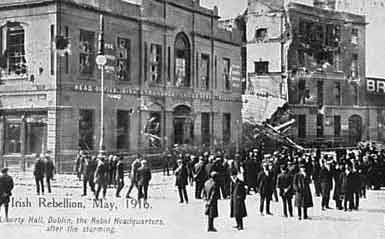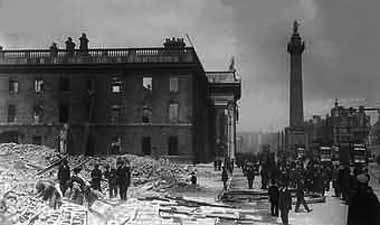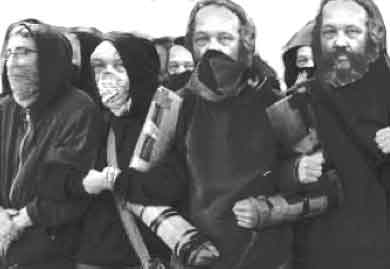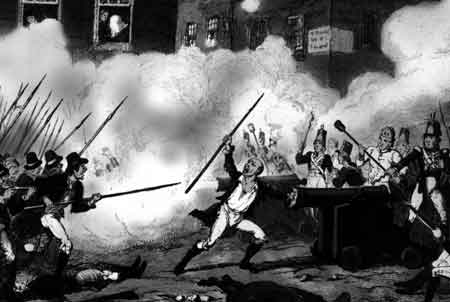Over 30 years of anarchist writing from Ireland listed under hundreds of topics
Andrew N Flood
1916 - Connolly, blood sacrifice and defeating British imperialism
 At 11.30 in the morning of April 24 1916 Bugler William Oman, a member of a syndicalist workers militia the Irish Citizen Army (ICA), sounded the 'fall-in' outside his union headquarters. This was the start of an insurrection in Dublin which was to see around 1,500 armed men and women seize key buildings throughout the city, and to hold these positions against thousands of British Army soldiers for almost a week. In the course of putting down the insurrection, 1351 people were killed or severely wounded and 179 buildings in the city centre were destroyed.(1)
At 11.30 in the morning of April 24 1916 Bugler William Oman, a member of a syndicalist workers militia the Irish Citizen Army (ICA), sounded the 'fall-in' outside his union headquarters. This was the start of an insurrection in Dublin which was to see around 1,500 armed men and women seize key buildings throughout the city, and to hold these positions against thousands of British Army soldiers for almost a week. In the course of putting down the insurrection, 1351 people were killed or severely wounded and 179 buildings in the city centre were destroyed.(1)
Image: Liberty hall after the rising
1916, left republicanism, anarchism and class struggle
 This article is an anarchist analysis of the 1916 insurrection and the war of independence in the context of the struggle for socialism in Ireland and internationally. It concentrates on the 'unknown' but intense class struggle that ran alongside the war of independence and the role republicanism played in the suppression of that struggle. It asks 'what is freedom' and shows how anarchism originated amongst earlier European left republicans as an answer to the limitations of republicanism.
This article is an anarchist analysis of the 1916 insurrection and the war of independence in the context of the struggle for socialism in Ireland and internationally. It concentrates on the 'unknown' but intense class struggle that ran alongside the war of independence and the role republicanism played in the suppression of that struggle. It asks 'what is freedom' and shows how anarchism originated amongst earlier European left republicans as an answer to the limitations of republicanism.
Image: O'Connell street after the insurrection
Summit Protests and Networks
 With the emergence of the summit protest movement into the public eye after J18 and Seattle, anarchism gained an influence way beyond what the numbers of anarchists and the level of anarchist organisation might have led you to predict. Quite quickly in the English speaking world, anarchism emerged from being a fairly obscure and historical critique of the left to become one of the main poles in the globalisation movement.It was not the long-existing anarchist organisations that achieved this. For the most part it was a new generation of activists using much more informal methods of organisation and communication. Rather than seeking to build one powerful and united organisation, they built thousands of small, informal and often quite short-lived ones. In fact 'built' is probably too strong a word for a process that in many cases consisted of a few friends coming together to travel to a protest and act together during it.
With the emergence of the summit protest movement into the public eye after J18 and Seattle, anarchism gained an influence way beyond what the numbers of anarchists and the level of anarchist organisation might have led you to predict. Quite quickly in the English speaking world, anarchism emerged from being a fairly obscure and historical critique of the left to become one of the main poles in the globalisation movement.It was not the long-existing anarchist organisations that achieved this. For the most part it was a new generation of activists using much more informal methods of organisation and communication. Rather than seeking to build one powerful and united organisation, they built thousands of small, informal and often quite short-lived ones. In fact 'built' is probably too strong a word for a process that in many cases consisted of a few friends coming together to travel to a protest and act together during it.
Direct Action against the Iraq war in Ireland
 Across the globe millions of people mobilised against the war in Iraq. On February 15th 100,000 people marched through the streets of Dublin in the biggest political protest in Southern Ireland for over 20 years. Around 15,000 demonstrated in Belfast on the same day.
Across the globe millions of people mobilised against the war in Iraq. On February 15th 100,000 people marched through the streets of Dublin in the biggest political protest in Southern Ireland for over 20 years. Around 15,000 demonstrated in Belfast on the same day.
The turnout on these demonstrations showed that the battle for public opinion had been won. Massive numbers of people opposed Bush and Blair's drive to war and the Irish government's role in it. But they seem to have had very little effect on the war. The governments concerned simply ignored them. In every country the anti-war movement was thus faced with the question of what to do next. After February 15th we should have expected to see the various movements internationally working on ways to stop the war despite the fact that their respective governments were ignoring them.
Bakunin's ideas on revolutionary organisation

The Russian revolutionary Micheal Bakunin is often presented as the 'founding father' of anarchism. He was a larger than life figure whose disputes with Marx in the 1st international form an essential role in the clarification of the role of the vanguard and of the state in the revolutionary process. Yet his concrete ideas on anarchist organisation are not so well knowm. Andrew N. Flood takes a closer look at them.
The 1798 Rebellion
 In 1798 Ireland was shook by a mass rebellion for democratic rights and against British rule. 200 years later 1798 continues to loom over Irish politics. The bi-centenary, co-inciding with the 'Peace process', has attracted considerable discussion, with the formation of local history groups, the holding of conferences and a high level of interest in the TV documentaries and books published around the event.
In 1798 Ireland was shook by a mass rebellion for democratic rights and against British rule. 200 years later 1798 continues to loom over Irish politics. The bi-centenary, co-inciding with the 'Peace process', has attracted considerable discussion, with the formation of local history groups, the holding of conferences and a high level of interest in the TV documentaries and books published around the event.
Anarchism, militarism and civil war - Can you have an anarchist army? - Looking at the Makhnovist Movement
AS ANARCHISTS believe the bosses will resist a revolution, it follows that we accept the need for armed force to defend the revolution. But anarchists also oppose militarism, that includes standing armies controlled by the state with officers who have special privileges like extra rations, better quarters, saluting, etc. So what alternative do anarchists propose? [Greek translation]
The Orange Order: an enemy of ALL workers
It is unfortunate, if perhaps somewhat inevitable, that the now annual battles around the 'marching season' fall along religious lines. The Orange parades are being used to test the supposed neutrality of the northern regime and the RUC in particular. The losing side in this dangerous game however is likely to be the working class, Protestant and Catholic, as the confrontations and the sectarian attacks that occur around the Orange marches drive people further into 'their own' communities.
Understanding the Zapatistas as a social movement
It is now five years since the EZLN (Zapatista Army of National Liberation) came to the attention of the world when they seized five towns in Chiapas on New Year's day in 1994. The years since have seen only a couple of weeks of actual warfare. However the uneasy cease-fire has seen hundreds of land occupations and several national and international gatherings. Thousands, if not tens of thousands, of people have travelled to Chiapas to see the rebellion with their own eyes. Hundreds have been deported by the Mexican government for doing so. Solidarity groups exist in most western countries, including Ireland. In 1993 Chiapas was as anknown backwater in Mexico. Now, in the eyes of many activists, it has moved to centre stage.
Peace deal offers sectarian war or sectarian peace
The huge vote, North and South, in favour of the 'Good Friday Agreement' shows that the vast majority do not want a return to pre-ceasefire violence. Can this agreement get to the root of the sectarian problem and deal with the hatreds, fears and suspicions that have bedevilled our country? Andrew Flood looks at the prospects.

